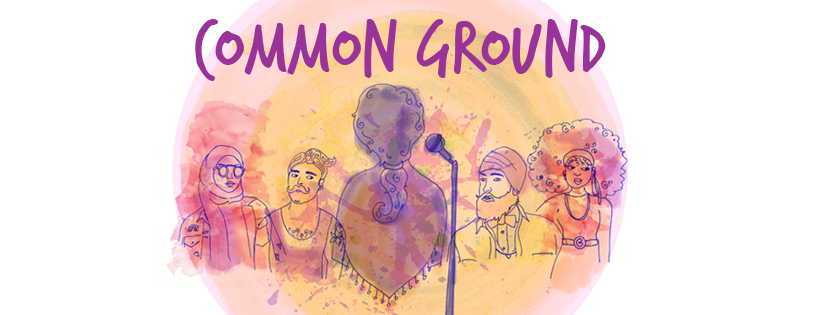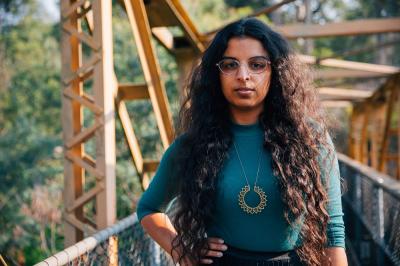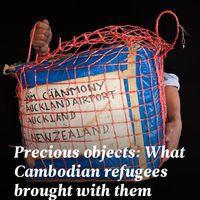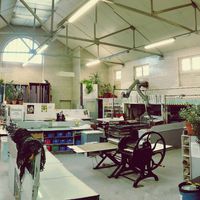Circles of telling and listening: Storytelling between cultures

“There is no story without a teller and a listener”, observes writer Merlinda Bobis. The storytelling cycle expands and becomes “ripples of telling and listening, and telling and listening all over again”.
When we are hearing stories of migration, who is telling the story and who is listening? Why are these stories so important?
A migration journey doesn’t begin with a person’s arrival in a new country, nor does it end when they have found a place to stay and a job. Rather, it is an on-going and complex process that involves issues such as living through traumatic experiences, hostility in the new country and the challenge of balancing two or more cultures. These difficulties can express themselves in everyday situations, such as not being able to buy ingredients that are familiar or not being able to listen to the news in their native language. As a migrant settles into their new country they make decisions every day about how they will navigate the difference of where they’ve come from and where they are, and this process can be confusing and exhausting.

Abdul Hammoud, Coordinator of Common Grounds
Image courtesy Multicultural Arts Victoria
In many cases refugees on the Thai/Myanmar border learnt about this challenging process before deciding whether to resettle to another country as part of a programme run by the International Organisation for Migration (IOM). In an effort to distribute information about this resettlement process IOM created a theatre programme within the camps in which refugee actors and theatre practitioners created a script and performed a play about a family who would be moving to Australia or another country. The theatre piece, performed at a number of refugee camps on the border, explored not only the practicalities of what they would find in their new country, but it also delved into the difficult decision making process and the emotional challenges they would face when they arrived at their new country.
The theatre piece brought to the surface the difficult negotiations that were often present within families, including a consideration of what the refugees would leave behind and how their position would change. It was a change that would not necessarily mean more comfort or wealth, and this was a reality that was better to face head on from the beginning.
Along side this theatre programme, which was run by the organisation facilitating the resettlement programme, a Karen (Myanmar) film group called Kaw Lah Films made the film Which Way Home? The film followed the experience of Ti Pah Eh who relocated from the Thai based Mae La camp to Melbourne, Australia. The filmmakers met with members of the community and also highlighted the challenges of resettling, including issues of marginalisation, loneliness and loss of culture. The film was then shown in refugee camps along the border so that refugees could make more informed decision about whether or not to resettle.
In both cases the creative storytelling was a way to distribute information but it was also a way to confront issues that may be difficult to discuss openly. They both highlighted that that resettling to another place brings its own challenges, and that these may outweigh the advantages for some. Telling these experiences in an engaging and creative way addressed hidden complexities of resettling.

Sukhjit Kaur Khalsa, Coordinator of Common Grounds
Image courtesy Multicultural Arts Victoria
Knowing about the process of settling into a new place before making the decision to leave helps to prepare for this big change. Migrants, whether they are refugees, economic migrants, professionals or international students, can face racism and prejudice from the community they have moved to, they often grapple with the challenge of balancing the beliefs and cultural norms of their homeland with their new place of residence. They may have trouble learning the language and accessing the employment sector, two stabilising factors that allow migrants to feel like they are participating in the community.
This sense of being involved in the community in a meaningful way is an important step in becoming settled in a new place, and it extends beyond economic fields of work. A project with Karen youth in Australia focused on music as a way of telling stories and expressing the difficulty of settling into a new country. Through short music videos focusing on harm reduction and health promotion messages the project sought to address the key challenges faced by the Karen community in Melbourne, such as loneliness, dropping out of school and substance abuse. It can be difficult to find a place in a new country, especially when refugees or migrants have experienced conflict or disruption in their education and in the case of these youth the difficulties of learning a new language while trying to keep up with school classes had created tension which caused some to struggle and lose their way.
Wee Thaw, a youth worker who wrote songs and performed in the videos, emphasised that music is a particular strength in the Karen community.
"People use it as a way to heal because the community has suffered enormously. No one has formal music training but so many play the guitar and other instruments. The project plays to our strength."
It is important to find the medium that suits each community and enables them to enjoy and feel comfortable telling their personal stories. In this case, the use of contemporary music was a way to reach younger communities.
Another project that was developed in response to everyday interaction of migrant’s lives was a multimedia project called Mother’s Spice – A taste of life-changing journeys. Organised by Information + Cultural Exchange (ICE) in Sydney, an organisation that works at the intersection between arts, technology and cultural engagement, the project involved stories told by four mothers from diverse backgrounds revolving around the act of sharing food as a way of connecting people. As one of the participants Nisha Shrestha said in an interview:
"When we got here, one of the first things we did, after the important things like finding a place to live and so on, was look for spices and food that we used in Nepal…After coming to Australia, the daily and regular things we used for cooking eating became very special."
Sharing food and cooking tradition is what initially connected the participants, but it soon became more than that as they told their stories through the food and eventually shared it with audiences in Western Sydney in 2016. As producer Eddie Abd observed, “We started talking about what we share, what we have in common, beyond food. Each had very different experiences, different backgrounds, but there were links between our lives.” The project was a way to connect with their traditions and sharing them with their new community.
For the participants of Common Ground, an inter-faith spoken word programme of workshops and performances by young people, telling their stories is a way to explore the role faith and identity in a country that is not always welcoming of difference. Organised by Multicultural Arts Victoria across a number of regions in Australia, one of the workshop facilitators Sukhjit Kaur Khalsa performed her spoken word work on Australia’s Got Talent (AGT). Expressing her experiences of stereotypes and racism as a Sikh woman, her performance garnered much support with the wider community. Sukhjit Kaur Khalsa first told her stories in the spoken word circuit, with poems such as ‘A dress/Address’ that focused on gender inequality. However, performing on Australia’s Got Talent was a way to test these stories on a wider stage. As she observed in an interview:
“I fell into the forgotten art form of spoken word poetry a couple of years ago…The people who come to these events are the converted, the leftist, artsy, advocates who click to every line with an understanding. It’s safe, comfortable, and easy. But what would a wider audience look like? How would they react to such prevalent issues? AGT was my golden ticket to challenge myself and see if I had what it takes to get up on the world stage and unapologetically voice my opinion. My story. My truth. Never did I expect such an overwhelming response.”
The positive reaction from the Australian public suggests that it’s time for more of these stories to be told across different audiences. In fact, a vital part of feeling settled in a place also involves how migrants are received. Not only do migrants need to find a place in their new community without losing touch of where they came from, the community into which the migrants are settling also need to learn about migrants´ cultural contexts. Therefore, projects that incorporate aspects of presentation to a wider audience are equally important. This can be seen in the Mother Spice project for example, which culminated in a public presentation.
Every experience of settling into a new place is different and presents a number of challenges to individuals, families and communities. Telling these stories of diverse experiences, whether through theatre, film, song or spoken word, is a way to ignite constructive and realistic discussions about the complex process of settling into a new culture. The strength of these programmes was in the way they encouraged dialogue and exchange.
As Common Ground participant Iffrah Malik observed:
“A lot of times people are under the impression that if you come from a developing country, and you come to a developed country that it is the best thing that could ever happen to you, but they don't realise that you're leaving behind a lot of things which are important to you."
Storytelling is not a one-way street. Rather it is a dialogue between a teller and a listener that, when it engages with multiple voices, can lead to a more productive understanding between migrants and the communities in which they live.
Claire Rosslyn Wilson is a poet and non-fiction writer who focuses on writing about arts and multicultural themes. She has eight years of professional experience in resource development and the arts and has worked with international and non-profit organisations in Thailand, Singapore and Australia. She has had her work published in various journals and is currently doing a PhD on creative writing and cultural adaptation. You can follow her on Twitter @clairerosslyn.
Similar content
from - to
02 Jun 2019 - 21 Jul 2019
posted on
19 Dec 2016
deadline
19 Nov 2021
posted on
26 Feb 2024





